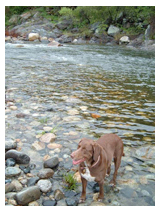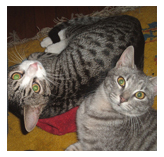Should I Change My Pet's Diet As It Ages?
- Details
- Category: Animal Issues and Pets
- Published on Thursday, 07 January 2010 21:46
- Written by Marcie Fallek
 NO. If your pet is doing fine on the food you feed it, there’s no need to change anything. If she’s experiencing problems related to aging such as constipation, or kidney or liver disease, follow these rules:
NO. If your pet is doing fine on the food you feed it, there’s no need to change anything. If she’s experiencing problems related to aging such as constipation, or kidney or liver disease, follow these rules:
Dogs need fiber. In general, healthy older dogs need a diet that’s lower in calories and protein, but higher in fiber, which can reduce the risk of anal gland disease (common in small dogs), obesity, and pancreatic problems like diabetes. To get fiber in your dog’s diet, feed her whole grains like brown rice or barley and vegetables such as chopped-up broccoli, Swiss chard, or kale (raw or lightly steamed). Put everything through a food processor so she won’t be able to pick out the meat and leave the rest. Speak to your vet to determine how much added fiber is needed.
Don’t ignore canine weight gain. Dogs don’t automatically get heavier as they age. Check with your vet to make sure your pet isn’t suffering from pain, arthritis, or hypothyroid problems.
Cats need custom care. If your cat has liver disease, decrease the amount of fat and protein in her diet. If kidney disease is the issue, feed her less protein, and make it fish, chicken, or lamb. Include some whole grains, like millet, bulgur, and cornmeal, and add vegetables or psyllium seeds for fiber. (Older cats can suffer from constipation.)

Don’t ignore feline weight loss. Unlike dogs, cats can suffer from hyperthyroidism. If your cat ignores food she’s always eaten or has lost eight ounces or more in a month, get her to the vet.
Buying guide. Healthy pet food brands for dogs and cats include Artemis, The Honest Kitchen, PetGuard, and Nature’s Variety. To accommodate weakened teeth, soften crunchy foods with gravy or water.
—Marcie Fallek, D.V.M., C.V.A., Animal Natural Healing Center, Fairfield, Conn.
